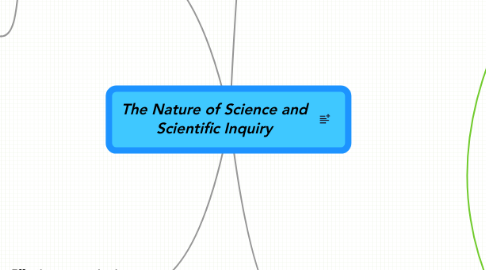
1. Activities to aid understanding
1.1. Arouse curiosity
1.2. prompt for more questions
1.3. need to be directive initially
1.4. KISS
1.5. Engage student interest
1.6. Must address student issues
1.6.1. limited background knowledge
1.6.2. lack of interest
1.6.3. unable to ask sound questions
2. Effective communication
2.1. Implicit
2.1.1. learn by doing science
2.1.2. debunked by Riley, 1979: Spears & Zolman, 1977
2.2. historical (narrative)
2.2.1. understand the history understand the nature
2.2.2. Proved ineffective by Abd-El-Khalick and Lederman (2000)
2.3. explicit, reflective
2.3.1. plan to teach NOS and SI
2.3.2. Be explicit about NOS and SI in the summary
3. What is scientific inquiry
3.1. Includes
3.1.1. processes
3.1.2. Critical thinking
3.1.3. scientific reasoning
3.1.4. Scientific knowledge
3.2. Not scientific method
3.3. different forms
3.3.1. Descriptive
3.3.2. corelational
3.3.3. experimental
3.4. Starts with a question
3.4.1. data is gathered
3.4.1.1. data is interpreted to produce evidence
4. What is the nature of science
4.1. Knowledge is tentative Change can occur because
4.1.1. New Evidence
4.1.2. Reinterpretation of old evidence
4.1.3. New theories change the view of the scientist
4.2. Knowledge is subjective influenced by the researcher
4.2.1. Theoretical commitments
4.2.2. Beliefs
4.2.3. Previous knowledge
4.2.4. Training
4.2.5. Experiences
4.2.6. Expectations
4.3. Socially and culturally embedded and may be influenced by
4.3.1. Social values
4.3.2. power structures
4.3.3. politics
4.3.4. socioeconomic factors
4.3.5. philosophy
4.3.6. religion
4.4. Empirically based
4.4.1. uses observations of the real world
4.5. Inferent
4.5.1. imagination creativity
4.5.1.1. invention
4.5.1.1.1. New Theories
4.5.1.1.2. New models
4.6. Observation and inference
4.6.1. Observation
4.6.1.1. descriptive statements
4.6.1.2. accessible to the senses
4.6.1.3. viable for easy concensus
4.6.2. Inference
4.6.2.1. require other knowledge
4.6.2.2. Not accessible to the senses
4.6.2.3. Interpretations
4.7. Laws and Theories
4.7.1. Laws
4.7.1.1. statements
4.7.1.2. based on observations
4.7.1.3. define relationships
4.7.2. Theories
4.7.2.1. explanations
4.7.2.2. based on inferences
